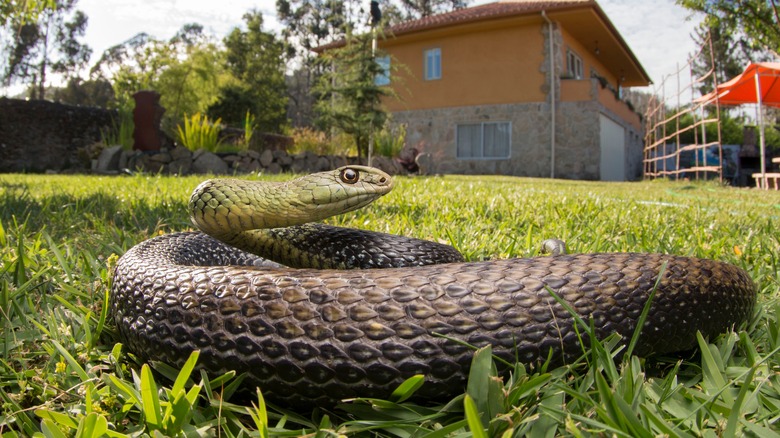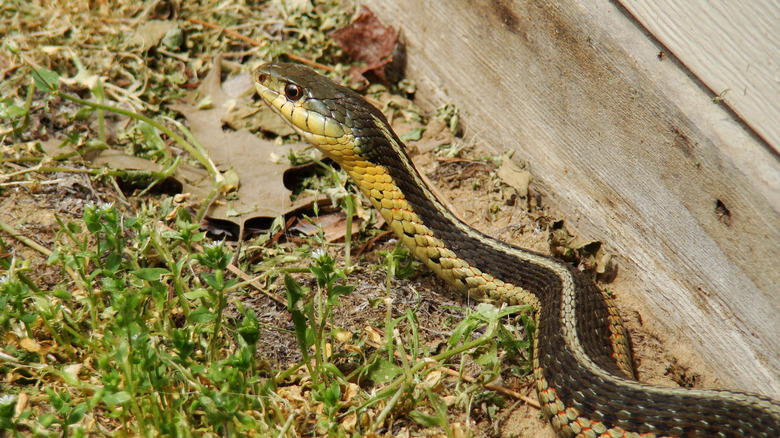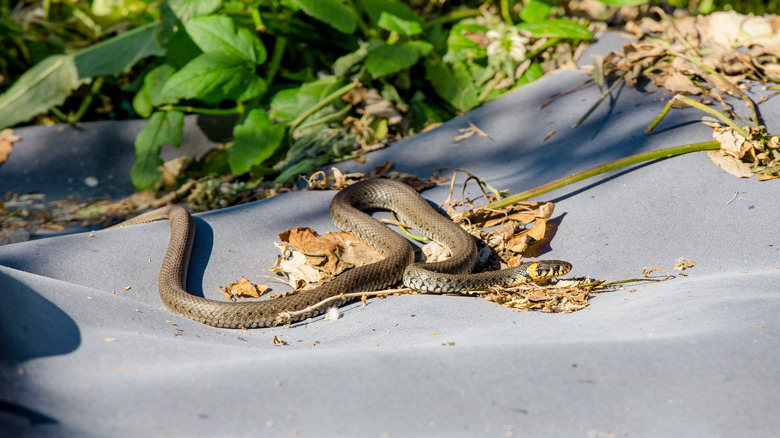The Most Common Place Snakes Hide In Your Yard
When spring hits and the weather gets warmer, we all get that urge to spend some time outside soaking up the sun. Unfortunately, snakes feel the same way. Snakes tend to hibernate during the winter and start to reappear looking for prey in March and April. This may lead to you seeing more snakes in your yard and garden around this time. While having snakes on your property isn't always fun, these critters are an important part of the ecosystem and can benefit your yard by eating rodents and grasshoppers. However, as the bite of some snakes like rattlesnakes and cottonmouths (both of which made it into our list of the 20 snakes ranked by danger level) requires a trip to the emergency room, it makes sense why you wouldn't necessarily want them hanging around in your yard.
However, to get rid of the snakes (or simply avoid them) you need to know where they are most likely hiding. When they aren't sitting in the sun, snakes typically like to spend their time in cozy and covered places like in tall grass, under sheds, in brush and woodpiles, under coiled hoses, and inside containers or tire swings.
How to make your yard less attractive to snakes
You can make your yard look less inviting for slithering reptiles by simply staying on top of your yard work and landscaping. Regularly trimming bushes, mowing your lawn, raking up dead leaves, and clearing brush piles will help remove many attractive hiding spots. If you have an outdoor woodpile, you should also consider storing it on a platform up off the ground to deter snakes from finding a cozy spot inside. You may also want to get rid of any water features like fountains and bird baths as these provide snakes with a water source (an important part of their preferred habitat).
On top of this, to keep snakes at bay it is important to eliminate what is drawing them to your yard in the first place: food. Snakes will not set up camp in a yard that doesn't have a reliable food source. So, if you have snakes, you likely also have rodents. You can try to limit the mice in your yard by securing your garbage, not leaving pet food outside, and regularly cleaning your grill. You may also want to clean up any spilled birdseed as it is another food source for rodents.
How to repel snakes
Although eliminating what is bringing the snakes to your yard is important, you can also add some deterrents to help boot them out even faster. To do this, your first option is to purchase a commercial snake repellent and spray it around your yard and garden to keep them from nesting in the area. You can also turn to more natural options to stop snakes from slithering through your yard like cinnamon oil, orange peels, ammonia, vinegar, or garlic oil. Try adding these deterrents to areas where snakes may hide in your yard. These natural methods aren't scientifically proven but many gardeners claim to have had success with them.
Beyond removing some of the more portable places snakes may hide, you can also install physical barriers to keep the serpents out. One option is to try laying down gravel as serpents typically don't like to slither across sharp or uneven surfaces. You can also opt to install a snake-proof fence. If you are really tired of the snakes in your yard, call a pest control company to lay out some traps. Once caught, the pest control agency will then relocate the reptiles to a safe and (most importantly) faraway location. Now that you've tackled your snake problem, learn how to keep cats away from your garden.


